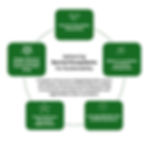Gallan, Andrew S., Alkire, Linda, Teixeira, Jorge Grenha, Heinonen, Kristina & Fisk, Raymond P. (2025
AMS Review

ABSTRACT:
Amidst an urgent need for sustainability, novel approaches are required to address environmental challenges. In this context, biomimicry offers a promising logic for catalyzing nature’s wisdom to address this complexity. The purpose of this research is to (1) establish a biomimetic understanding and vocabulary for sustainability and (2) apply biomimicry to upframe service ecosystems as a foundation for sustainability. Our research question is: How can the principles of natural ecosystems inform and enhance the sustainability of service ecosystems? The findings highlight upframed service ecosystems as embodying a set of practices that (1) promote mutualistic interactions, (2) build on local biotic and abiotic components supporting emergence processes, (3) leverage (bio)diversity to build resilience, (4) foster resource sharing for regeneration, and (5) bridge individual roles to optimize the community rather than individual well-being. Our upframed definition of a service ecosystem is a system of resource-integrating biotic actors and abiotic resources functioning according to ecocentric principles for mutualistic and regenerative value creation. The discussion emphasizes the implications of this upframed definition for sustainability practices, advocating for a shift in understanding and interacting with service ecosystems. It emphasizes the potential for immediate mutualistic benefits and long-term regenerative impacts.








